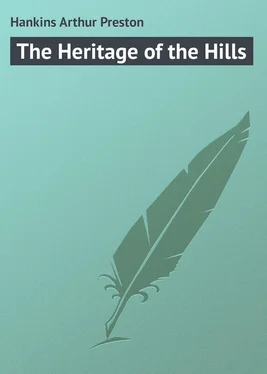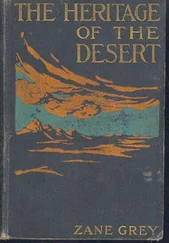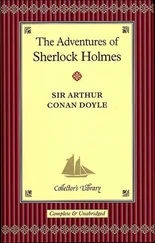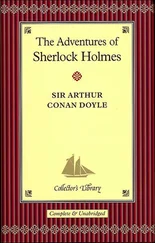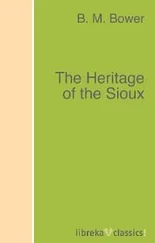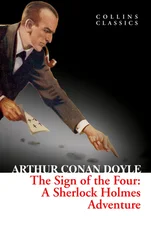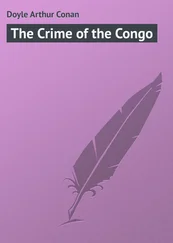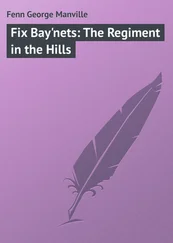Arthur Hankins - The Heritage of the Hills
Здесь есть возможность читать онлайн «Arthur Hankins - The Heritage of the Hills» — ознакомительный отрывок электронной книги совершенно бесплатно, а после прочтения отрывка купить полную версию. В некоторых случаях можно слушать аудио, скачать через торрент в формате fb2 и присутствует краткое содержание. Жанр: foreign_prose, foreign_adventure, на английском языке. Описание произведения, (предисловие) а так же отзывы посетителей доступны на портале библиотеки ЛибКат.
- Название:The Heritage of the Hills
- Автор:
- Жанр:
- Год:неизвестен
- ISBN:нет данных
- Рейтинг книги:5 / 5. Голосов: 1
-
Избранное:Добавить в избранное
- Отзывы:
-
Ваша оценка:
- 100
- 1
- 2
- 3
- 4
- 5
The Heritage of the Hills: краткое содержание, описание и аннотация
Предлагаем к чтению аннотацию, описание, краткое содержание или предисловие (зависит от того, что написал сам автор книги «The Heritage of the Hills»). Если вы не нашли необходимую информацию о книге — напишите в комментариях, мы постараемся отыскать её.
The Heritage of the Hills — читать онлайн ознакомительный отрывок
Ниже представлен текст книги, разбитый по страницам. Система сохранения места последней прочитанной страницы, позволяет с удобством читать онлайн бесплатно книгу «The Heritage of the Hills», без необходимости каждый раз заново искать на чём Вы остановились. Поставьте закладку, и сможете в любой момент перейти на страницу, на которой закончили чтение.
Интервал:
Закладка:
But the country was delightful. Wild grapevines grew in profusion at the creekside, gracefully festooned from overhanging buckeye limbs. Odorous alders, several varieties of willow, and white oak also followed the watercourse; and up on the hills on either side were black oaks and live oaks, together with yellow and sugar and digger pines, and spruce. Everywhere grew the now significant poison oak.
Finally Poche scraped through chaparral that almost hid the road and came out in a clearing. Oliver at last stood looking at his future home.
A quaint old cabin, with a high peaked roof, apparently in better repair than he had expected, stood on a little rise above the creek. The cañon widened here, and narrowed again farther down. The creek bowed and followed the base of the steep hills to the west. A level strip of land comprising about an acre paralleled the creek, and invited tillage. All about the clearing, perhaps fifteen acres in area, stood tall pines and spruce, and magnificent oaks rose above the cabin, their great limbs sprawled over it protectingly. Acres and acres of heavy, impenetrable chaparral covered both steep slopes beyond the conifers.
For several minutes Oliver drank in the beauty of it, then heaved himself into the saddle and galloped to the cabin over the unobstructed land.
He loosed Poche when the saddle and bridle were off, and the horse eagerly buried his muzzle in the tall green grass. Up in the branches paired California linnets, red breasted for their love season, went over plans and specifications for nest-building with much conversation and flit-flit of feathered wings. Wild canaries engaged in a like pursuit. Overhead in the heavens an eagle sailed. From the sunny chaparral came the scolding quit-quit-quit of mother quail, while the pompous cocks perched themselves at the tops of manzanita bushes and whistled, "Cut that out! Cut that out!" All Nature was home-building; and Oliver forgot the loss of the fortune he had expected at his father's death and caught the spirit.
He collected oak limbs and built a fire. He carried water from the creek and set it on to boil. While waiting for this he strolled about, revelling in the soft spring air, fragrant with the smell of wild flowers.
That the cabin had been occupied often by hunters and other wanderers in the cañon was evidenced by the many carvings on the door and signs of bygone campfires all about. He stepped upon the rotting porch and studied the monograms, initials, and flippant messages of the lonely men who had passed that way.
"All hope abandon, ye who enter here" was carved in ancient letters just under the lintel of the door. Next he was informed that "Fools names, like their faces, are always seen in public places." "Only a sucker would live here" was the parting decision of some disgruntled guest. "Home, Sweet Home" adorned the bottom of the door. One panel had proved an excellent target, and no less than twenty bullet holes had made a sieve of it. "Welcome, Wanderer!" and "Dew Drop Inn" and "Though lost to sight to memory dear" occupied conspicuous places. Then on the right-hand frame he noticed this:
The carving was neatly executed. The leaves represented were indisputably those of the poison oak.
Had some one carved this in a jocular effort to warn chance visitors to the place of the danger of the poison weed? Or did the carving represent the emblem of the Poison Oakers?
Oliver smiled grimly and opened the door.
He passed through the three small rooms of the house and investigated the loft. The structure seemed solid. A new roof would be necessary, and new windows and frames and a new porch; and as Oliver was no mean carpenter, he thought he could make the cabin snug and tight for seventy-five dollars.
The front door had closed of itself, he found, when he started back to his campfire. He stopped in the main room, and a smile, slightly bitter, flickered across his lips. As neatly carved as was the symbol of the Poison Oakers outside – if that was what it was – and evidently executed by the same hand, was this, on the inside of the door:
JESSAMY, MY SWEETHEART
Oliver went on out and squatted over his fire, peeling potatoes. His blue eyes grew studious. In the flickering blaze he saw the picture of a black-eyed, black-haired girl on a white horse crouched on its haunches.
"Great Scott!" he muttered. "I'll have to forget that!"
In the month that followed, Oliver Drew, spurred by feverish enthusiasm, worked miracles on the Old Tabor Ivison Place. He repaired the line fences and rehabilitated the cabin; bought a burro and pack-saddle and packed in lumber and tools and household necessities; fenced off his experimental garden on the level land with rabbit-tight netting; cleaned and boxed the spring; and early in May was following the spading up of his garden plot by planting vegetable seed.
With all this behind him, he went at the clearing of the road that connected him with his kind. Today as he laboured with pick and shovel and bar he was cheerful, though his thoughts clung to the subject of his father's death and the odd situation in which it had left him. He had fully expected to inherit properties and money to the extent of a hundred thousand dollars. He was not particularly resentful because this had not come to pass, for he never had been a pampered young man; but the mystery of his father's last message puzzled and chagrined him.
He would always remember Peter Drew as a peculiar man. He had been a kindly father, but a reticent one. There were many pages in his past that never had been opened to his son. Oliver was the child of Peter Drew's second wife. About the queer old Westerner's former marriage he had been told practically nothing.
Believing his father to have been of sound mind when he penned that last strange communication, Oliver could not hold that the situation which it imposed was not for the best. Surely old Peter Drew had had some wise reason for his act, and in the end Oliver would know what it was. He had been told to seek the Clinker Creek Country to learn the question that had puzzled his father for thirty years, to decide whether the proper answer was Yes or No, and communicate his decision to his father's lawyers. That was all. When in the wisdom which his father had supposed would be the natural result of his son's university training he had made his decision and placed it before these legal gentlemen, what would happen? Speculation over this led nowhere.
At first it had seemed to Oliver that the mission with which he had been intrusted was more or less a secret matter, and that he must keep still about it. Then as the staunch cow-pony bore him nearer and nearer to the Clinker Creek Country it gradually dawned upon him that, by so doing, he might stand a poor chance of even finding out what had puzzled his sire. To say nothing of the answer which he was to seek. It was then he decided that he had nothing to hide and must place his situation before the people of the country who would likely be able to help him. Hence his confidences to Mr. Damon Tamroy.
Tamroy had aided him not at all; but the 'Forty-niner, Old Dad Sloan, knew something. Dan Smeed, outlaw, highwayman, had owned a saddle and bridle like Oliver's. The old man had mysteriously mentioned the lost mine of Bolivio, and had said the settings in Oliver's conchas were gems. If only the old man could be made to talk!
The muffled thud of a horse's hoofs came between the strokes of Oliver's pick. With an odd and unfamiliar sensation he glimpsed a white horse and rider approaching through the pines.
It was she – Jessamy Selden – the black-haired, black-eyed girl of whom he reluctantly had thought so often since his first day in the Clinker Creek Country.
She was riding straight down the cañon, the white mare gingerly picking her way between boulders and snarls of driftwood. The girl looked up. Oliver felt that she saw him. Her ears could not have been insensible to the ring of his pick on the flinty stones. She did not leave the trail, however, but continued on in his direction.
Читать дальшеИнтервал:
Закладка:
Похожие книги на «The Heritage of the Hills»
Представляем Вашему вниманию похожие книги на «The Heritage of the Hills» списком для выбора. Мы отобрали схожую по названию и смыслу литературу в надежде предоставить читателям больше вариантов отыскать новые, интересные, ещё непрочитанные произведения.
Обсуждение, отзывы о книге «The Heritage of the Hills» и просто собственные мнения читателей. Оставьте ваши комментарии, напишите, что Вы думаете о произведении, его смысле или главных героях. Укажите что конкретно понравилось, а что нет, и почему Вы так считаете.
